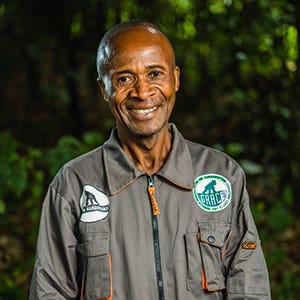Honoré Kambale Masumbuko Mustafa grew up in the Democratic Republic of the Congo (DRC). Over the years, he’s lived in many places in North Kivu province, along the eastern border of DRC, including Lubero, Rutshuru, and Goma.
From a young age, Honoré’s fate has been intertwined with that of the gorilla. Virunga National Park, one of the last remaining safe havens for the Critically Endangered Eastern Lowland Gorilla (also known as the Grauer’s Gorilla) and home to the Endangered Mountain Gorilla, sits just north of the areas where Honoré spent most of his life. As a child, he visited Virunga National Park on a special trip to observe the Mountain Gorillas of Rumangabo. This encounter set him on a trajectory from which he’s never departed.
“From that period up to now, I’ve been very lucky to be in contact with some natural wonders like lakes, rivers, forest, and wildlife,” Mustafa reflects. He describes his love for the natural world as being “in his blood” since childhood.This passion has served as his main motivator for community outreach and conservation education. Prior to joining GRACE Gorillas, Honoré was a professor and primatologist. Honoré has blended a love of learning and inquiry with a purpose to engage and inspire others for more than a decade in his role as Education Manager & Research Assistant at GRACE.
“The conservation of chimpanzees and gorillas within Tayna is something that people have taken as custom, like other customs we teach to our children."
- Honoré Kambale Masumbuko Mustafa
Honoré describes the act of sharing knowledge as akin to planting seeds. “By seeding what I know, I’m also preparing the future generation with my communities.” It’s at the core of what drives him at the Gorilla Rehabilitation and Conservation Education center, better known as GRACE Gorillas.
Working alongside Congolese communities, GRACE envisions a healthy, stable population of wild Eastern Lowland Gorillas in the DRC. The organization cares for rescued gorillas and supports Congolese communities in conserving wild gorillas and their habitat. This takes the form of various initiatives, including gorilla rehabilitation and conservation education. GRACE works in collaboration with local community organizations, including La Réserve des Gorilles de Tayna (RGT), the community-appointed management authority responsible for overseeing the nearby Tayna Nature Reserve.
Tayna Nature Reserve, a biodiversity hotspot and a stronghold for Eastern Lowland Gorillas, was created by the local community, who established the local association RGT to manage the reserve. In 2006, Tayna became the first community-managed reserve recognized by the Congolese government, receiving full protection under Congolese law. Today the reserve spans nearly 350 square miles (900 square kilometers) protecting some of the healthiest forest ecosystems in the DRC.
Ultimately, GRACE Gorillas aims to reinforce the pride the Congolese people have for their irreplaceable wildlife. Honoré believes that this is central to the success of gorilla conservation in the region. He says that the locals in the greater Tayna area southwest of the Virunga Mountains consider it tradition to care for these primates. The widespread perception of gorillas as “neighbors” makes conservation outreach a pleasure for Honoré and his team.
“The conservation of chimpanzees and gorillas within Tayna is something that people have taken as custom, like other customs we teach to our children,” Honoré explains. “Educating people in Tayna on conserving gorillas and chimpanzees is something familiar. We just reinforce them. We remind them of the message which they got from their ancestors that we should continue to conserve gorillas.”
Primate conservation is not only firmly rooted in Congolese culture, but the law as well. Since the last remaining Eastern Lowland Gorillas live only in the DRC, the country has been integral to the species’ protection. Beginning in 1991 with the International Gorilla Conservation Programme, the DRC and organizations like GRACE Gorillas have supported locals with the knowledge and resources to conserve gorillas, chimpanzees, and their habitat.
Honoré’s daily work plays a direct role in this. It takes time, but he notes that investing in local communities in such a way can ultimately become self-sustaining. Those who engage with GRACE’s programming show a strong sense of ownership around conservation and identify themselves as gorilla protectors. Many share their knowledge with peers, sometimes so effectively that GRACE can pass on the torch of leadership and education to those who were once students.
“People who have been training are now our messengers,” Mustafa reports. “There are many cases in which we only intervene as observers, seeing people from the community teaching one another, teaching themselves, under our supervision. We have been training people to be educators, and they’re doing that within their community.”
Through primary school education programs and partnerships with community-led organizations like SPEED-DRC, Honoré and his team aim to empower residents of nearby villages with the tools and training needed to take positive conservation action. For example, this year GRACE Educators taught over 100 women to create and use fuel-efficient stoves to reduce the amount of wood needed for cooking. In the village of Kagheri, GRACE Educators also helped community members plant a sustainable woodlot to use for household needs rather than having to collect wood from the forest. Across multiple villages, and through programs like these, Honoré prepares future generations to continue in the tradition of gorilla and forest protection. The process is one of reciprocity, propagating this crucial knowledge throughout Congolese society.
Honoré revels in his work and hopes to be remembered for his contributions to conservation in perpetuity. He describes his experience of community education and outreach as an act of sowing the seeds of knowledge that will ultimately grow into a lush environment of sustainable, gorilla-friendly living for Congolese families.
“What I am doing will continue to be memorable to other generations. They will continue to transmit what they have learned from me,” Honoré declares optimistically. “I’m doing an action which will not have an end.”

